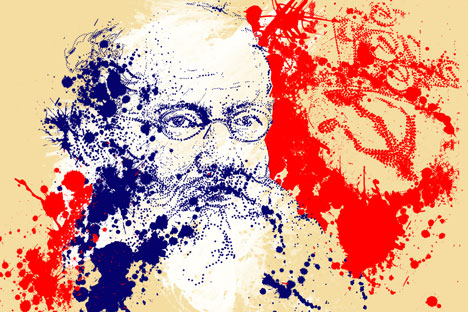
Click to enlarge the image of Peter Kropotkin. Drawing by Natalia Mikhaylenko
As the father of Russian anarchism, Prince Peter Kropotkin (1842–1921) understood society as a voluntary cooperation of free people.
The word “anarchy” immediately calls to mind a black flag, skull and crossbones, drunk sailors and general lawlessness. Kropotkin preached nothing of the sort. He was a serious, learned man. He also hated violence with all his heart.
Like many other 19th-century Russian revolutionaries, he was born into a wealthy noble family and belonged to the elite. His father had more than a 1,000 serfs and three estates.
Kropotkin graduated from the Page Corps, the most privileged military institution in Russia. He was a personal chamber page to Tsar Alexander II. Brilliant professional possibilities lay before him — he could have become a general or minister.
Yet he disregarded all of this and joined the revolution. Having read illegal literature, he put an end to his career. He refused a prestigious post in the guards and set out for Siberia.
During his foray among the people, Kropotkin became convinced that all evil came from the government. In places where the government’s hand did not reach, people lived in poverty, but happily.
They organized themselves into communes and successfully existed without taxes and bureaucrats.
While he was in Switzerland, Kropotkin took note of how the watchmakers’ cooperative was set up. There was no boss above the workers, yet the workers’ cooperative functioned smoothly.
This was a true anarchic commune as Kropotkin understood it, a community of free people who work not by necessity but by their own will. In Switzerland he joined the First International, the same organization that Karl Marx joined.
Kropotkin returned from abroad as a confirmed revolutionary and started to disseminate revolutionary propaganda. He was a skilled conspirator, and for a long time the police could not capture him even though they knew about his activities.
He constantly disguised himself — for example, as a student or a peasant. He also frequently changed clandestine apartments. An elegant young man in glasses would enter a building, and a peasant in a print shirt and dirty boots would exit.
The transfiguration was absolute. But in the end he was, of course, arrested. He was imprisoned in the Peter and Paul (Petropavlovskaya) Fortress, one of Russia’s most dismal jails. He served out two years and escaped.
This is the only instance of evasion — only a reckless person dared to flee from the Peter and Paul (Petropavlovskaya) Fortress.
Kropotkin went abroad and continued his antigovernment activities. Indeed, anarchy is a rejection of government and the government machine.
He gathered many supporters; they distributed a newspaper with a defiant name, “Rebel,” spread propaganda and even carried out terrorist acts.
Kropotkin had no connection to the terrorist acts, but he was in the limelight and was too offensive a figure. Hence he was expelled from all the European countries.
In France he was even sentenced to five years in jail. However, Victor Hugo and other well-known figures came to his defense and Kropotkin’s sentence was shortened to three years. He served it in full.
No government — neither capitalist nor socialist — likes anarchists. When Kropotkin returned to Russia during the revolution, conflicts arose between him and the Bolsheviks.
The Bolsheviks’ brutality horrified the old anarchist. By nature he was softhearted and kind, and he could in no way recognize the red terror. He understood anarchism first and foremost as cooperation and solidarity. Yet a war of everyone against everyone was raging.
“And I have spent my whole life working on a theory of anarchy for this!” he lamented to Plekhanov, one of the oldest Marxists. Plekhanov said to Kropotkin, “Peter Alexeyevich, I too am in the same situation. Could I have thought that my advocacy for a scientific socialism would lead to such a nightmare?”
Kropotkin met with Lenin and tried to reason with him, asking him to stop the executions. Lenin laughed at him. At the time, no one took Kropotkin seriously.
Even the celebrated anarchist Nestor Makhno worshipped Kropotkin yet considered his ideas out of touch with reality and outmoded.
When Kropotkin died, the Soviet powers honored him as a fighter against the cursed tsarist regime. They named streets and towns after him.
In central Moscow there is a subway station named Kropotkinskaya. For a while, there was also a Kropotkin museum. However, in the late 1930s it was closed. Kropotkin’sbooks also stopped being published.
The Soviet government was finding its footing and getting more and more powerful. Ideas of anarchy were entirely foreign.
Yet anarchism has turned out to be a surprisingly hardy trend. As long as a government exists, there will always be people fighting against its oppression.
The famous saying “Anarchy is the mother of order” is less absurd if anarchy is understood as Kropotkin meant it: a splendid utopia, an ideal arrangement of society, where thinking citizens work in one another’s interest and where authority, overseers and supervisors do not exist.
It is a marvelous picture, albeit a completely improbable one. But the great dreamer Kropotkin believed that one day, everything would be that way.
All rights reserved by Rossiyskaya Gazeta.
Subscribe
to our newsletter!
Get the week's best stories straight to your inbox